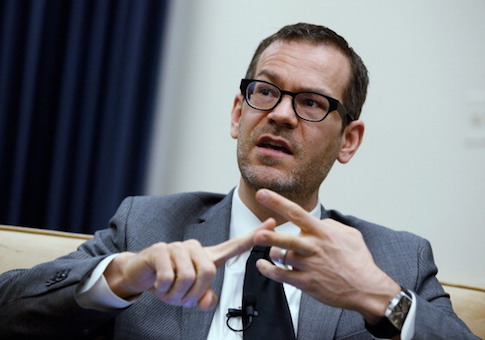A top Obama administration national security adviser who helped craft the administration’s approach to Iran’s nuclear aspirations has been named a senior fellow at Stanford University’s Freeman Spogli Institute for International Studies.
Colin Kahl, who served as national security adviser to Vice President Joe Biden and deputy assistant secretary of defense for the Middle East at the Pentagon, will be the first Steven C. Házy fellow, a position affiliated with the Center for International Security and Cooperation, starting in January 2018, according to a press release.
His Stanford work will include research on contemporary international security issues, such as "the implications of emerging technologies for strategic stability and nuclear rivalry," and writing a book "examining American grand strategy in the Middle East after 9/11," according to the release.
Kahl, who also previously served as a foreign policy adviser to the Obama campaign, played a role in the creation of the Iran Nuclear Deal.
Kahl was also responsible for removing from the DNC 2012 platform the recognition of Jerusalem as Israel’s capital.
Kahl remains a fierce defender of the Joint Comprehensive Plan of Action, the 2015 Iran nuclear deal that was recently called "fundamentally flawed" by National Security Adviser H.R. McMaster, and in a Wall Street Journal op-ed co-authored by Mark Dubowitz, CEO of the Foundation for the Defense of Democracies, and David Albright, president of the Institute for Science and International Security.
The deal’s so-called sunset clause, which dictates that the restrictions limiting Iran’s stock of low-enriched uranium and the number of centrifuges it can operate will be automatically lifted between 2025 and 2030, enables Tehran to eventually construct an industrial-scale nuclear program if the regime only bides its time, critics argue.
In a Foreign Policy piece titled "The Myth of a ‘Better’ Iran Deal," published Tuesday, Kahl responded to Dubowitz and Albright, and insisted that "the Obama administration didn’t botch negotiations with Tehran."
Citing attacks on the flaws and loopholes in the JCPOA, Kahl says that the deal is not a failure, because it was impossible to strike an agreement that would have "permanently dismantled Iran’s nuclear infrastructure, eliminated the country’s ballistic missile program, and ended all Iranian misbehavior in the region."
"There is simply no evidence that the regime in 2015 would have buckled" to harsher sanctions, Kahl concluded.
He dismisses as a "myth" the hope expressed by the Trump administration and Israeli officials, including Prime Minister Benjamin Netanyahu, that a better deal could have been and might still be reached.
Prior to his stint at the White House, Kahl was an associate professor at Georgetown University.
He tweeted Wednesday that he "is thrilled to be joining" the Stanford faculty.
